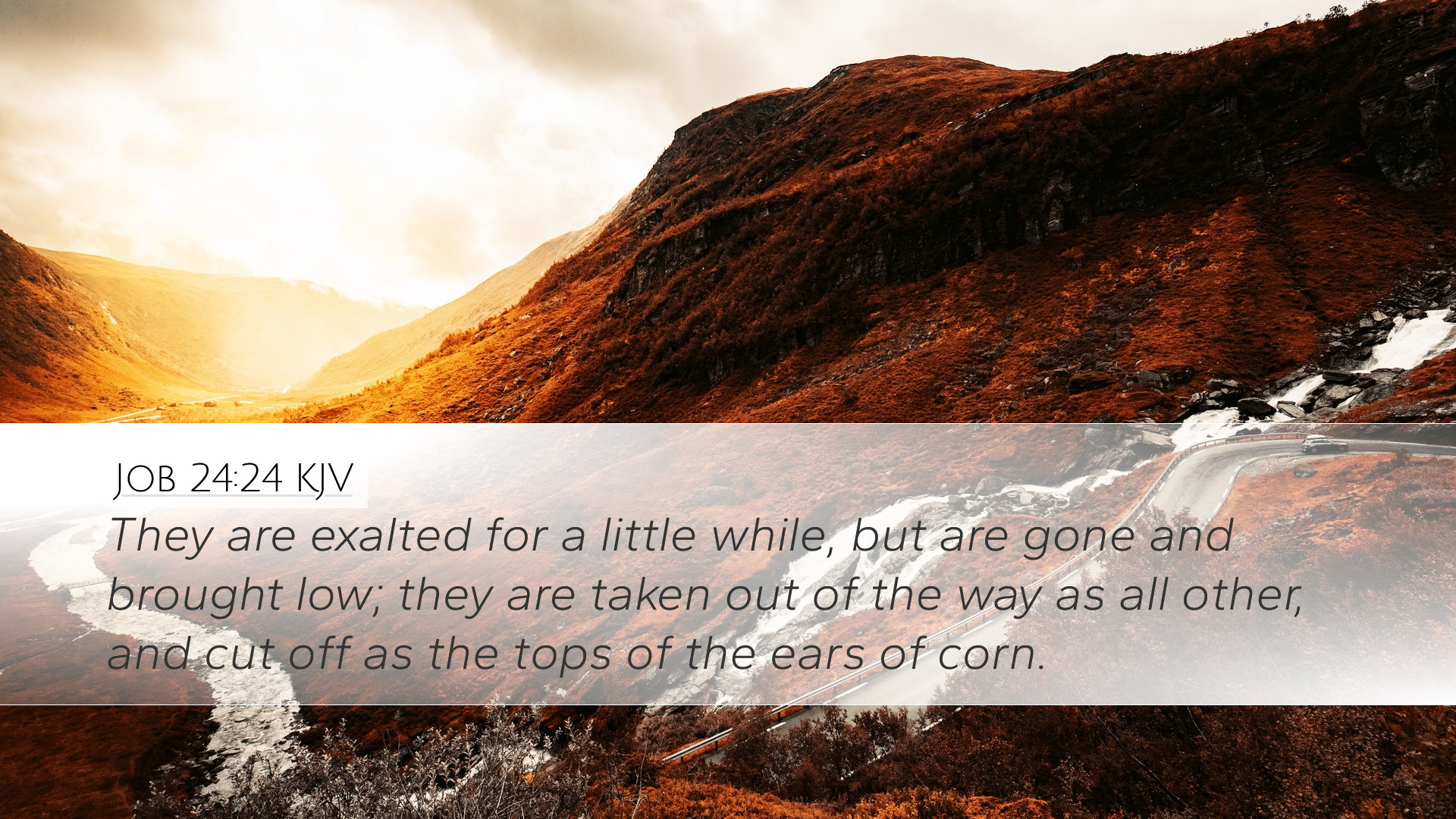Old Testament
Genesis Exodus Leviticus Numbers Deuteronomy Joshua Judges Ruth 1 Samuel 2 Samuel 1 Kings 2 Kings 1 Chronicles 2 Chronicles Ezra Nehemiah Esther Job Psalms Proverbs Ecclesiastes Song of Solomon Isaiah Jeremiah Lamentations Ezekiel Daniel Hosea Joel Amos Obadiah Jonah Micah Nahum Habakkuk Zephaniah Haggai Zechariah MalachiJob 24:24
Job 24:24 KJV
They are exalted for a little while, but are gone and brought low; they are taken out of the way as all other, and cut off as the tops of the ears of corn.
Job 24:24 Bible Commentary
Commentary on Job 24:24
Job 24:24 states, "They are exalted for a little while, but are gone and brought low; they are taken out of the way as all other, and cut off as the tops of the ears of corn." This verse reflects a profound understanding of human existence, the fleeting nature of life, and God's sovereignty over all creation. The subsequent commentary delves into various aspects of this significant verse, drawing insights from respected public domain commentaries.
Context of Job 24:24
The entire chapter of Job 24 is a poignant discourse on the plight of the wicked and the justice of God. Job is asserting that the prosperity of the wicked and their eventual downfall is part of a larger divine order that may not always be immediately recognizable to human understanding.
Exalted for a Little While
Matthew Henry emphasizes the temporary nature of the wicked's success. He notes that like a passing shadow, their exaltation is brief. Their fortunes might seem favorable for a time, but they will ultimately fade away.
Albert Barnes contends that this verse serves as a sobering reminder that earthly power and wealth are transient. He suggests that men often rise to prominence without considering the inevitable decline that follows. This reflection urges believers to focus on eternal values rather than transient achievements.
The Comparison to Corn
The imagery of being "cut off as the tops of the ears of corn" encapsulates the fragility of life and human endeavors. Adam Clarke interprets this as a metaphor for how quickly the harvest can be taken, highlighting the idea that just as corn can be easily removed, so too can the lives of the proud come to an abrupt end.
Clarke's insights reveal a deeper theological principle: that all human glory is subject to the will of God, and ultimately, all will yield to His sovereignty.
The Justice of God
The underlying theme in Job 24:24 speaks to the justice of God amidst the apparent injustices of life. Matthew Henry remarks that while it may seem that the wicked thrive, this perception is superficial. God sees all and will execute justice in His own timing.
Albert Barnes reiterates this by stating that God's justice may not be immediate but will ultimately prevail. This serves as a source of comfort for the faithful, instilling hope that despite current appearances, righteousness will be recognized and rewarded.
Encouragement to the Believer
Believers are encouraged by Job 24:24 to maintain their faith in God's ultimate plan. Matthews Henry suggests that in the face of adversity, Christians must remember that God permits trials for a season but upholds the righteous in the end.
Furthermore, Adam Clarke emphasizes the importance of living righteously despite the surrounding evil. This call to action encourages believers to focus on their spiritual walk rather than being envious of the success of the wicked.
Theological Implications
This succinct verse invites profound theological reflection. The brevity of life, the preeminence of divine justice, and the assurance of God’s ultimate control over human affairs provoke a multitude of questions regarding God, existence, and morality.
Albert Barnes points out that it provides significant insights into the nature of sin and the fate awaiting the unrepentant. The comparison to the harvest signifies the finality of death and the transition to the divine judgment where all will be evaluated based on their life choices.
Practical Applications
For pastors, students, and Bible scholars, Job 24:24 provides multiple avenues for application:
- Encouragement in Trials: Remind congregants or students that temporary afflictions can have eternal significance.
- Justice and Patience: Encourage patience in waiting for God’s justice to be realized. Foster hope in the faithful through community teachings.
- Focus on Eternal Values: Guide discussions towards the significance of an eternal perspective in the face of worldly success.
- Life Choices: Emphasize the importance of integrity and righteousness as foundational principles for believers.
Conclusion
Job 24:24 serves as a poignant reminder of the delicate balance between life, justice, and the fate of the ungodly. Through the insights offered by the foundational commentaries of Matthew Henry, Albert Barnes, and Adam Clarke, we see a rich tapestry of theological reflection that invites believers to look beyond the struggles and injustices of the present life, anchoring their hope in God’s eternal justice and sovereignty. Emphasizing the brevity of worldly power encourages a deeper commitment to living a life that honors God amid life's transitory nature.


